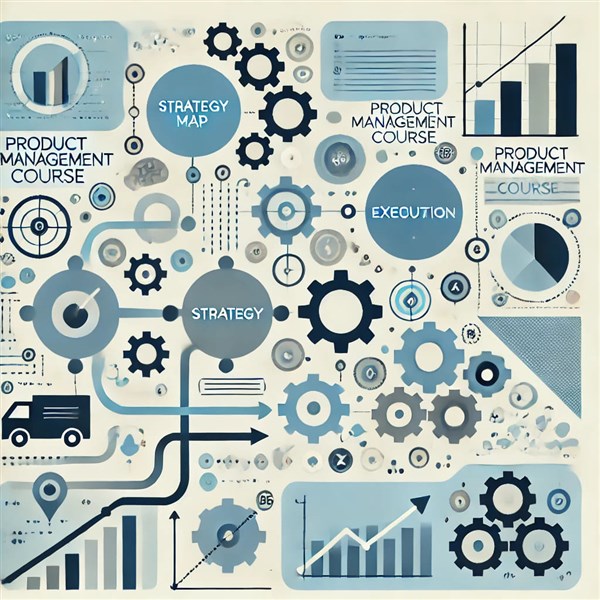
As companies increasingly prioritize customer-centric, data-driven product strategies, the demand for skilled product managers continues to grow. Product management courses are designed to equip aspiring and current product managers with the knowledge and expertise required to thrive in this dynamic field. From market research to analytics and strategic decision-making, these courses cover a comprehensive skill set essential for managing a product’s lifecycle and achieving business goals. In this blog, we’ll explore the specific skills you’ll gain from a product management course and how each of these competencies contributes to your effectiveness as a product manager.
Skills You'll Gain from a Product Management Course
1. Market Research and Customer Analysis
Why It Matters
Market research is the cornerstone of successful product management. Before developing a product, it’s essential to understand market needs, customer pain points, and emerging trends. Product management courses often begin with market research, teaching you how to conduct surveys, analyze competitor data, and understand customer demographics.
Skills You’ll Develop
- Survey Design and Execution: Learn how to design customer surveys that yield valuable insights.
- Competitor Analysis: Understand how to analyze competitors to identify gaps and opportunities in the market.
- Customer Personas: Develop skills in creating customer personas based on behavioral and demographic data to guide product design.
By mastering these research techniques, you’ll gain the insights needed to ensure your product aligns with customer needs, setting a strong foundation for success.
2. Product Strategy and Roadmapping
Why It Matters
A well-defined product strategy aligns the product vision with business goals. Without a clear roadmap, it’s easy to lose direction, resulting in feature bloat or misalignment with customer expectations. Product management courses emphasize the importance of strategic planning, helping you learn how to balance short-term requirements with long-term goals.
Skills You’ll Develop
- Vision and Goal Setting: Develop a strategic vision that aligns with your company's mission and market positioning.
- Product Roadmapping: Learn to create roadmaps that prioritize features, timelines, and resources based on customer needs and company objectives.
- Feature Prioritization: Understand frameworks like RICE (Reach, Impact, Confidence, and Effort) or MoSCoW (Must Have, Should Have, Could Have, Won't Have) to prioritize features effectively.
These skills allow you to build a roadmap that guides product development, ensuring focus on the most impactful features while staying adaptable to market changes.
3. Agile and Lean Methodologies
Why It Matters
Agile and Lean methodologies are central to modern product management, as they encourage adaptability and customer-focused iterations. Learning Agile and Lean practices enables you to work efficiently with development teams, respond quickly to feedback, and continually improve the product.
Skills You’ll Develop
- Sprint Planning and Backlog Management: Learn to organize and prioritize development tasks in manageable sprints.
- Iteration and Feedback Loops: Understand how to gather customer feedback, iterate on product design, and adjust accordingly.
- Minimum Viable Product (MVP) Development: Master the Lean concept of building MVPs to validate ideas before investing significant resources.
By mastering these methodologies, you’ll be able to guide your team through a responsive development process, allowing you to deliver customer-centered products efficiently.
4. Cross-Functional Collaboration
Why It Matters
Product managers work with various teams, including engineering, marketing, sales, and customer support. Effective cross-functional collaboration ensures that everyone is aligned on the product’s goals, timelines, and desired outcomes. Product management courses provide training in communication and leadership, essential for working harmoniously with diverse teams.
Skills You’ll Develop
- Effective Communication: Learn to clearly articulate product goals, updates, and changes to all stakeholders.
- Team Leadership: Develop leadership skills to guide cross-functional teams and keep them focused on shared objectives.
- Conflict Resolution: Master techniques for resolving conflicts that may arise when balancing different team priorities.
With these skills, you’ll be able to lead cross-functional teams effectively, ensuring alignment and cooperation throughout the product’s lifecycle.
5. Data Analytics and Metrics
Why It Matters
In today’s data-driven world, product managers are expected to make decisions backed by concrete data. Analytics skills help you understand customer behavior, identify usage patterns, and measure the impact of product changes. Product management courses typically include training on key performance indicators (KPIs) and analytical tools to help you track product performance.
Skills You’ll Develop
- KPIs and Metrics Identification: Learn to define KPIs relevant to your product, such as user engagement, retention rates, and conversion rates.
- Data Interpretation: Understand how to interpret data and derive actionable insights.
- A/B Testing and Experimentation: Gain skills in running A/B tests and experiments to evaluate the impact of new features or changes.
These analytical skills allow you to monitor product performance objectively and make informed decisions based on real customer behavior.
6. User Experience (UX) and Design Thinking
Why It Matters
A product’s success is highly dependent on user satisfaction, which is directly influenced by user experience (UX) design. Product management courses often introduce you to design thinking principles, helping you develop empathy for users and create products that are intuitive and engaging.
Skills You’ll Develop
- User Journey Mapping: Learn to visualize and analyze the user journey to identify pain points and opportunities.
- Wireframing and Prototyping: Gain hands-on experience with basic wireframing tools, enabling you to communicate design ideas effectively.
- Usability Testing: Understand the importance of usability testing and learn how to conduct tests that validate design assumptions.
With a strong foundation in UX and design thinking, you’ll be better equipped to create products that not only meet functional requirements but also provide an enjoyable user experience.
7. Financial Literacy and Business Acumen
Why It Matters
Product managers are often responsible for ensuring that their products are profitable. This requires a solid understanding of financial principles, including budgeting, forecasting, and return on investment (ROI) analysis. Product management courses often cover basic finance and business acumen to help you make economically sound decisions.
Skills You’ll Develop
- Budgeting and Cost Analysis: Learn how to budget for development costs and analyze expenditures to ensure profitability.
- ROI Calculation: Understand how to calculate ROI for new features or projects to justify investments.
- Product Pricing Strategies: Gain insight into different pricing strategies and how they can influence product positioning and customer perception.
By gaining financial literacy, you’ll be able to make decisions that align with your product’s business objectives and contribute to the organization’s bottom line.
8. Product Lifecycle Management
Why It Matters
Every product goes through a lifecycle, from ideation to launch, growth, maturity, and eventual decline. Understanding each phase and its unique challenges is essential for effective product management. Product management courses cover the entire product lifecycle, teaching you how to navigate each stage and make adjustments as needed.
Skills You’ll Develop
- Lifecycle Analysis: Learn to assess where your product stands in its lifecycle and make strategic decisions accordingly.
- Feature Sunset Planning: Understand how to phase out outdated or low-value features, ensuring product relevance over time.
- Sustaining and Growth Strategies: Gain skills in identifying opportunities for product enhancements, scaling, and expansion.
Lifecycle management skills enable you to maintain product relevance, support growth, and adapt to changing market conditions.
9. Risk Management and Problem-Solving
Why It Matters
Product managers face challenges that can impact project timelines, budgets, and overall success. Risk management skills help you identify potential pitfalls early on and develop contingency plans. Courses typically include problem-solving exercises, helping you build resilience and adaptability.
Skills You’ll Develop
- Risk Identification and Mitigation: Learn how to assess risks associated with product development and prepare mitigation strategies.
- Root Cause Analysis: Understand how to analyze problems thoroughly and identify their underlying causes.
- Crisis Management: Develop techniques for handling unexpected setbacks without compromising product objectives.
By mastering risk management and problem-solving, you’ll be equipped to handle challenges effectively and keep the product development process on track.
Conclusion
A product management course offers a diverse range of skills that prepare you for the complexities of managing a product’s lifecycle. From market research and product strategy to cross-functional collaboration and data analytics, each skill contributes to your effectiveness as a product manager. By mastering these competencies, you’ll be better equipped to build and launch successful products that meet customer needs and drive business growth. Whether you’re new to product management or looking to sharpen your skills, investing in a product management course is a valuable step toward career advancement.
In conclusion, a Product Management Course can equip you with the essential skills required to excel in the field of product management.
Koenig Solutions, a leading IT training company, offers comprehensive Product Management Courses that are designed to develop these skills and more. Enroll now and take your product management career to new heights.







COMMENT